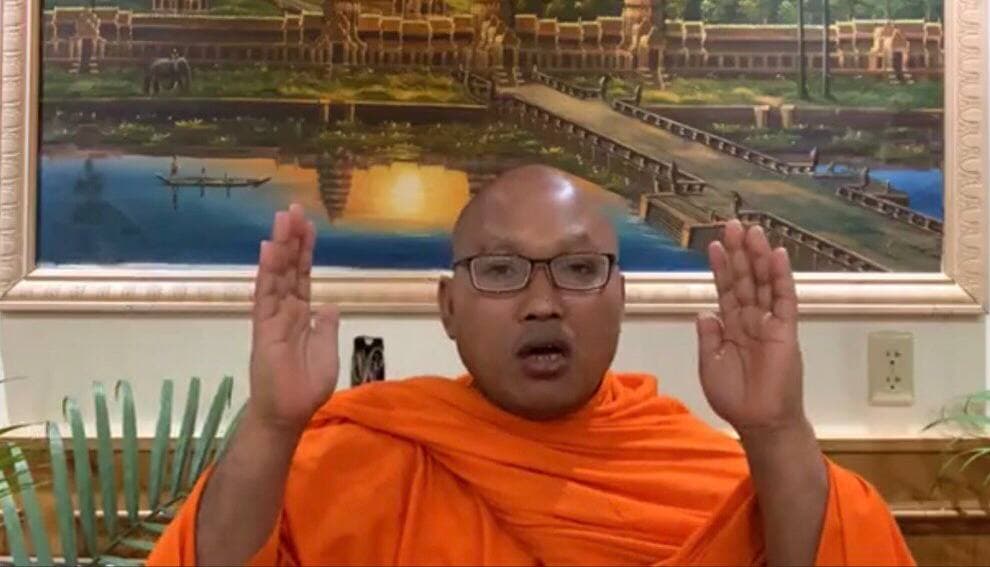Former opposition leader Sam Rainsy was among five people handed jail terms over incitement-related offences on Wednesday – adding to a growing catalogue of prison sentences facing the longtime opponent of Prime Minister Hun Sen should he return to Cambodia.
The Phnom Penh Municipal Court also sentenced prominent activist monk But Buntenh and three former officials the outlawed Cambodian National Rescue Party, linking them to Rainsy’s failed plan to return to Cambodia and “restore democracy” last year, as the latest crackdown on voices of dissent rolls on.
Rainsy was handed a two-year prison term for a social media post calling for Cambodians to boycott loan repayments to microfinance firms, while But Buntenh was sentenced to 20 months for criticizing Cambodia’s chief monk. Both live in exile to avoid previous charges that rights groups call politically motivated.
Judge Ros Piseth also handed down 18-month sentences to Ouk Chhum, 74, and Lors Chhenglay, 51, two former CNRP officials in Battambang province, for “incitement to commit a felony”; and a 20-month sentence to CNRP local official Tum Bunthorn for social media critique of the government that amounted to incitement.
Rainsy was ordered to pay $500,000 in damages; the other four received fines between $500 and $1,000; and the court issued arrest warrants for Rainsy, But Buntenh and Bunthorn, whose whereabouts is unknown.
“The court has not found justice related to these charges,” Sam Sokong, defense lawyer for Rainsy and But Buntenh said following the verdict, adding that the trial had been one-sided.
“In a democratic country, they could exercise their freedom of expression and criticism.”
The convictions come amid a slew of arrests of activists and others affiliated with the outlawed CNRP in recent months, leading the U.N. to call for Cambodia to uphold its own laws and commitments to international standards
“Civic and democratic space in Cambodia has continued to shrink and there remains little evidence of political rapprochement and reconciliation,” special rapporteur Rhona Smith said in a statement last month.
“The mass trials of CNRP activists appear to be politically motivated, lacking clear legal grounds and constitute a serious violation of the due process rights,” she said.
During last week’s trail hearing, judges questioned Chhum, a former commune chief in Klaing Meas, and Chhengly, a former executive chief in Bavel district, over an alleged phone conversation that precluded their arrest in July.
The two discussed how an astrologer had said that Prime Minister Hun Sen would “die without a coffin by 2023,” the judge said, comments that were linked to the plan of Rainsy and his deputies to return to Cambodia in November 2019.
Lor Chunthy, defense lawyer for the pair, said the prosecution had failed to provide sufficient evidence to inculpate his clients and called the ruling “unreasonable.”
“Based on the trial, they just had a conversation about an astrologer,” he said.
But Buntenh, who fled Cambodia in 2017 after being charged for misappropriating funds collected for the funeral service of slain political activist Kem Ley, rejected the court’s ruling.
The government “intends to restrict human rights and tighten my freedom of expression, following their plan to destroy democracy,” he said following the verdict via a livestreamed video from the U.S., where he is seeking political asylum.
“We can see the current court system persecuting Khmer citizens, especially those who dissent,” he said.
The convictions come as Rainsy and his deputies say once more that they are preparing to return to Cambodia on January 4 – a move that has failed numerous times in the past, with neighboring countries unwilling to provide safe passage for the outlawed politicians.
The majority of the CNRP’s top-brass have fled Cambodia since the party was outlawed in 2017, while more than 150 lower level officials and supporters have been arrested in the past 18 months and about 20 have been the victims of seemingly unprovoked violence, rights groups say.
On Monday, Rainsy was charged under controversial lese majeste laws for insulting Cambodia’s king; on Tuesday, the court opened a trial of Rainsy, seven former CNRP lawmakers and 13 supporters accused of conspiring to topple the government.
Am Sam Ath, deputy director of rights group Licadho, said the latest convictions are clearly “politically motivated.”
“If we talk about justice, there is no justice because there is no equality before the law when convicted in absentia,” he said.








